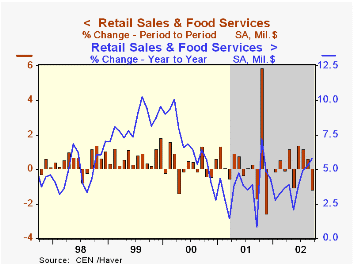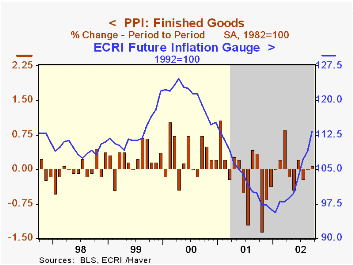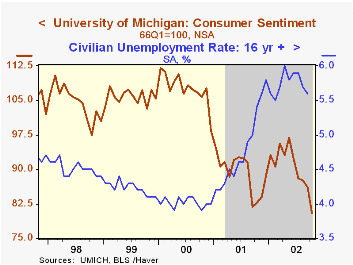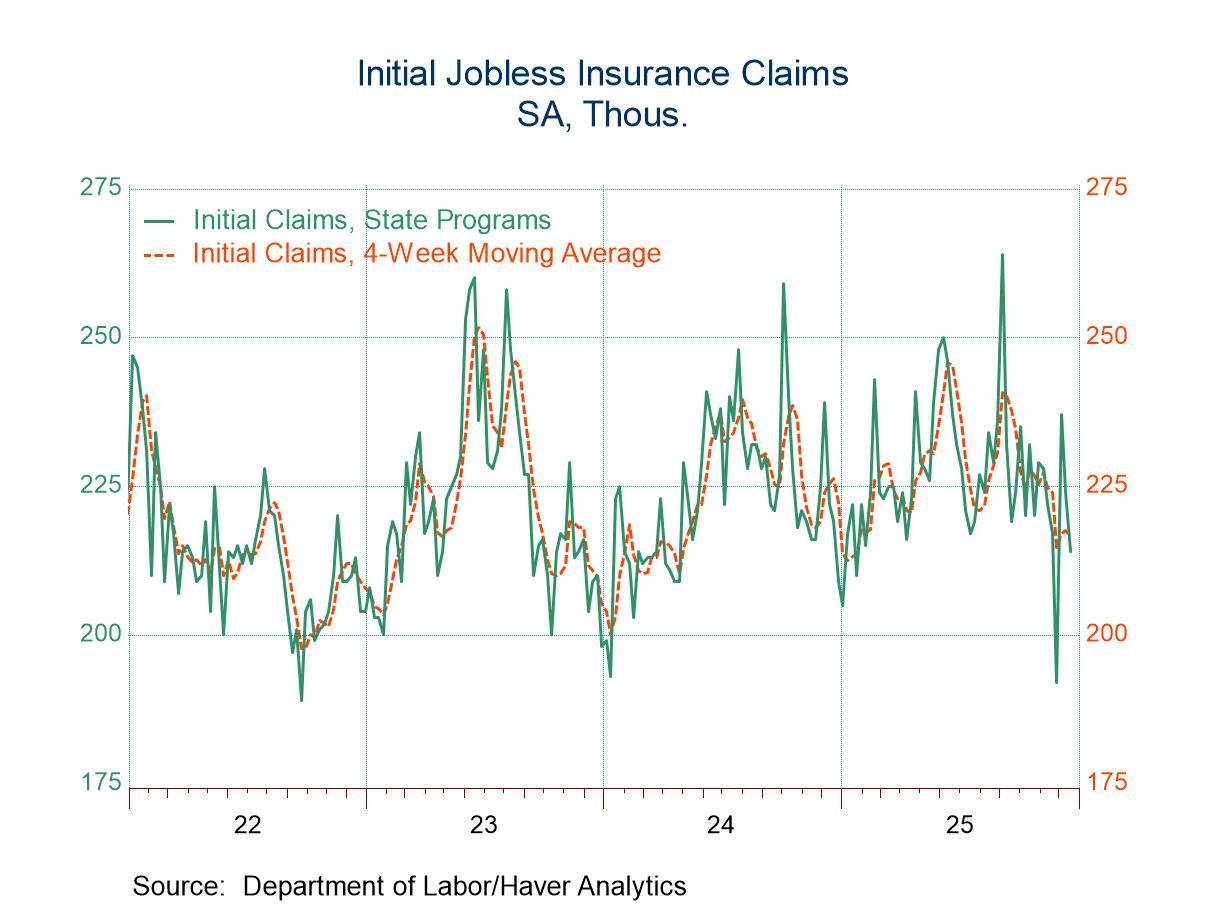 Global| Oct 11 2002
Global| Oct 11 2002Retail Sales Decline
by:Tom Moeller
|in:Economy in Brief
Summary
Retail sales fell about as expected last month following firm August gains that were revised slightly down. Year to date retail sales were up at a 3.3% annual rate through September. Sales of motor vehicle and parts fell a sharp 4.8%. [...]

Retail sales fell about as expected last month following firm August gains that were revised slightly down. Year to date retail sales were up at a 3.3% annual rate through September.
Sales of motor vehicle and parts fell a sharp 4.8%. New vehicle purchases dropped 12.6% m/m to a 16.32 mil. unit annual rate.
Sales excluding motor vehicles and parts dealers rose 0.1% (4.6% AR, YTD), slightly below the consensus expectation.
Sales at furniture and home furnishing stores fell 0.4% (-0.8% AR, YTD), the fifth m/m decline this year. Clothing and accessories store sales also were weak, down 0.9% (-0.9% AR, YTD). General merchandise store sales fell as well, off 0.1% (4.5% AR, YTD).
Sales at gasoline stations were flat following a 0.7% August decline. Nonauto retail sales less gasoline rose 0.1% (4.1% AR, YTD).
| Sept | Aug | Y/Y | 2001 | 2000 | 1999 | |
|---|---|---|---|---|---|---|
| Retail Sales & Food Services | -1.2% | 0.6% | 5.8% | 3.8% | 6.7% | 8.4% |
| Excluding Autos | 0.1% | 0.3% | 5.2% | 3.4% | 7.3% | 7.4% |
by Tom Moeller October 11, 2002

Finished producer prices rose slightly last month, as expected. Excluding food and energy prices also rose an expected 0.1%. Core producer prices were down 0.4% (AR) year to date.
Energy prices rose 0.9% (10.9% AR, YTD). Gasoline prices (74.0% AR, YTD) were strong for the third consecutive month and fuel oil prices also jumped m/m (72.1% AR, YTD). For a discussion by the Atlanta Fed of supplies in the oil market, go here.
Food prices fell for the fifth month in six (-2.6% AR, YTD).
Core finished consumer goods prices rose a slight 0.1% for the first gain in three months (-0.1% AR, YTD). Core nondurable goods prices rose slightly for the second month (1.0% AR, YTD). Consumer durables prices rose 0.1% (-1.3% AR, YTD). Capital goods prices were unchanged following two down months (-0.9% AR, YTD).
Intermediate goods prices were strong owing to higher petroleum prices. Core intermediate prices rose just 0.1% (1.9% YTD, AR).
Crude goods prices also were firm (18.7% AR, YTD) reflecting higher energy prices. Other commodities prices, reflected by the core crude price measure, fell but were up 14.6% (AR) year to date.
| Producer Price Index | Sept | Aug | Y/Y | 2001 | 2000 | 1999 |
|---|---|---|---|---|---|---|
| Finished Goods | 0.1% | 0.0% | -1.8% | 2.0% | 3.7% | 1.8% |
| Core | 0.1% | -0.1% | -0.4% | 1.4% | 1.3% | 1.7% |
| Intermediate Goods | 0.5% | 0.4% | -0.3% | 0.4% | 4.9% | 0.1% |
| Core | 0.1% | 0.4% | 0.5% | -0.1% | 2.6% | -0.3% |
| Crude Goods | 0.6% | 1.6% | 0.9% | 0.3% | 22.8% | 1.5% |
| Core | -0.6% | 0.4% | 8.2% | -9.9% | 7.3% | -4.7% |
by Tom Moeller October 11, 2002

Consumer Sentiment fell sharply in mid-October according to the University of Michigan. Sentiment fell 1.7% (m/m) to its lowest since 1993.
The decline was much greater than consensus expectations and was the seventh this year.
Indexes of consumer expectations and current conditions both fell hard.
The University of Michigan survey is not seasonally adjusted. It is based on a survey of 500 households.
| University of Michigan | Mid-Oct | Sept | Y/Y | 2001 | 2000 | 1999 |
|---|---|---|---|---|---|---|
| Consumer Sentiment | 80.4 | 86.1 | -2.8% | 89.2 | 107.6 | 105.8 |
Tom Moeller
AuthorMore in Author Profile »Prior to joining Haver Analytics in 2000, Mr. Moeller worked as the Economist at Chancellor Capital Management from 1985 to 1999. There, he developed comprehensive economic forecasts and interpreted economic data for equity and fixed income portfolio managers. Also at Chancellor, Mr. Moeller worked as an equity analyst and was responsible for researching and rating companies in the economically sensitive automobile and housing industries for investment in Chancellor’s equity portfolio. Prior to joining Chancellor, Mr. Moeller was an Economist at Citibank from 1979 to 1984. He also analyzed pricing behavior in the metals industry for the Council on Wage and Price Stability in Washington, D.C. In 1999, Mr. Moeller received the award for most accurate forecast from the Forecasters' Club of New York. From 1990 to 1992 he was President of the New York Association for Business Economists. Mr. Moeller earned an M.B.A. in Finance from Fordham University, where he graduated in 1987. He holds a Bachelor of Arts in Economics from George Washington University.






